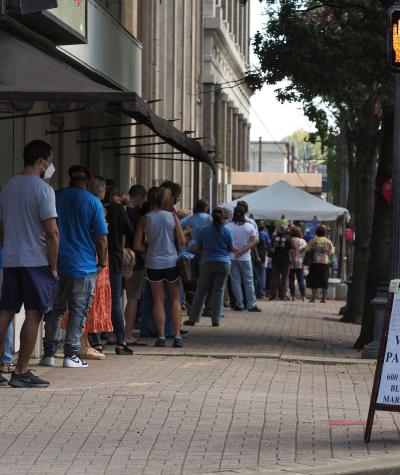Thousands of North Louisiana voters finally received a long-awaited answer to a yearslong struggle to vote in person on Sept. 23, 2021. The Caddo Commission approved an additional early voting location in the parish.
The approval of the early voting location came after years of advocacy which culminated with organizations, including the Campaign Legal Center (CLC) writing to the commission, about the vast racial and socioeconomic disparity caused by the lack of early voting capacity in the region.
Caddo Parish, home to more than 150,000 registered voters, has only had a single early voting location to serve those voters. The lack of early voting access has disproportionately burdened Black voters in a region comprised of the third-largest population of voters in the state.
The new locations will provide better access to rural voters and Black voters in the parish.
Further south in Iberia Parish, voters of color face significant barriers to voting in person on Election Day. Earlier this summer, the Parish Council quietly voted to close or consolidate more than a dozen polling places ahead of the statewide fall 2021 elections.
CLC and other advocates found that a majority of the polling places closed were assigned to mostly Black voters in the parish, all of whom will now be moved to new locations.
CLC and partners sent a letter to the Parish Council demanding that they provide answers to Iberia voters and requesting that they do everything to ensure that those voters are aware of the change before Election Day on November 13.
This advocacy comes against the backdrop of a gap left behind by the Supreme Court’s decision in Shelby County v. Holder, which struck down a key provision of the Voting Rights Act that required certain states with a history of racial discrimination in voting — including Louisiana — to “preclear” changes to their voting laws with the federal government.
This preclearance process helped to determine whether those changes imposed disproportionate burdens on voters of color.
As CLC's report on the state shows, several of Louisiana’s largest parishes — comprised of the majority of Black voters in the state — have systematically closed or consolidated polling places in Black neighborhoods since the Shelby County decision.
As CLC said in its recent testimony given before the House Committee on Administration, the consequences of Shelby County have reverberated across the Deep South.
Counties and localities across Louisiana, Mississippi and Alabama have closed polling places in predominately Black areas quietly and steadily — and often without notice to those voters until Election Day.
Advocates on the ground have trouble aiding voters in finding their polling places because the information is disparate and often outdated. CLC is stepping up to aid those local organizers in identifying in-person voting disparities and advocating for better access.
While CLC takes pride in supporting the work of local advocates fighting for better in-person voting access, advocates cannot continue to do this work alone. Voters need help from the federal government to make the promise of democracy real for us all.
Congress must pass the Freedom to Vote Act and the John Lewis Voting Rights Advancement Act to restore the Voting Rights Act of 1965 and protect the freedom to vote for voters of color.
Whatever our color, background or zip code, in America we value fair representation. We must call out for national standards to protect our freedom to vote.

